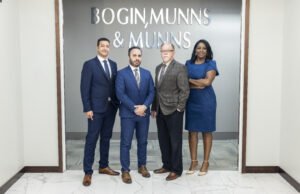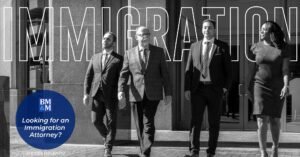
At Bogin, Munns & Munns, we provide legal advice and services in U.S. immigration law. Our team is experienced in handling visa applications for professionals looking to continue their careers in the United States.
Our national immigration lawyers are committed to detailed and thorough legal representation for STEM professionals with a minimum of five years of experience, including doctors, professors, scientists, and those with bachelor’s degrees.
We distinguish ourselves by proactively addressing challenges and giving our clients dependable guidance and confidence in their immigration endeavors. Contact our firm today to schedule a consultation.
Professional EB Visa Services Lawyer
The visa attorneys at Bogin, Munns & Munns offer comprehensive legal services for individuals seeking EB visas, which are designed for employment-based permanent residency in the United States.
Our legal team handles all categories of EB visas, assisting clients from the initial application to the final stages of obtaining their green card.
Understanding EB Visas
The EB visa program includes several categories, each targeted at different groups of professionals and workers:
Here’s a breakdown of each category:
EB-1 Visas
This category is reserved for individuals who possess extraordinary abilities in their fields, including the arts, sciences, education, business, or athletics.
It also covers outstanding professors and researchers recognized internationally for their contributions to academia, as well as multinational executives and managers who have been employed overseas in the same corporation or firm.
EB-2 Visas
It is aimed at professionals holding advanced degrees (beyond a bachelor’s degree) or individuals with exceptional ability in the arts, sciences, or business.
This category typically requires a demonstration of significant expertise and the fact that their contributions will substantially benefit the U.S. national interest.
EB-3 Visas
This group includes skilled workers with at least two years of job experience or training, professionals with a baccalaureate degree, and other workers engaged in unskilled labor that requires less than two years of training or experience.
The EB-3 visa is essential for various sectors needing qualified labor.
EB-4 Visas
Known as the visa for “special immigrants,” this category includes certain religious workers, employees of U.S. foreign service posts, retired employees of international organizations, and other specific classes of aliens, such as those who have assisted the U.S. government in various capacities.
EB-5 Visas
They are designed for immigrant investors ready to invest significant amounts in a U.S. enterprise that will create or preserve at least 10 full-time jobs.
Choosing the Right Visa Category
The selection of the correct visa category is critical and is based on your professional achievements, educational background, and specific needs. Other common professional visa categories include:
- H-1B Visas: H-1 visas like the H-1B are designated for individuals in specialty occupations that require a high degree of specialized knowledge, often supported by at least a bachelor’s degree or its equivalent in relevant work experience.
- L-1 Visas: These visas facilitate the transfer of key employees, such as executives, managers, or individuals with specialized knowledge, from an affiliated foreign office to one in the United States.
- O-1 Visas: These visas are aimed at individuals who demonstrate extraordinary ability through sustained national or international acclaim in the sciences, arts, education, business, or athletics or who have a record of extraordinary achievement in the motion picture or television industry.

EB Visa Denial Defense Lawyers at Bogin, Munns & Munns
Facing an EB visa denial can be a significant setback for professionals and investors aiming to establish residency in the United States.
At Bogin, Munns & Munns, we provide legal defense and support to clients who experience this frustration. Our experienced national immigration attorneys are prepared to challenge denials and seek remedies that protect your interests and immigration objectives.
Handling the Appeal Process
An EB visa denial is not the end of the road. There are several avenues available for contesting a denial, including motions to reopen or reconsider and appeals to the Administrative Appeals Office (AAO) or the Board of Immigration Appeals (BIA).
Our lawyers are skilled in preparing compelling legal arguments and navigating the procedural nuances of the appeal process.
Common Reasons for EB Visa Denials and Our Strategies
EB visa applications can be denied for various reasons, such as application errors, insufficient evidence of eligibility, or issues with the labor certification process. Our approach includes:
- A thorough review of the USCIS’s decision: We begin by meticulously analyzing the USCIS decision letter to understand the specific reasons for your denial.
- Correcting application errors: If application errors contributed to your denial, we guide our clients through the process of correcting and resubmitting applications.
- Strengthening evidence: We assist clients in gathering additional evidence and documentation to address deficiencies noted by the USCIS.
- Providing legal arguments and advocacy: We prepare detailed legal briefs and arguments to challenge wrongful denials or misinterpretations of the law by the USCIS.
Proactive Legal Representation
At Bogin, Munns & Munns, we understand that your situation is unique. We provide personalized legal counsel matched to your circumstances and immigration goals. Our team is committed to advocating for your right to a fair processing of your visa application.
Understanding the Professional Visa Application Process: Key Aspects to Consider
Legal assistance is required to guide you through the process of obtaining a professional visa, ensuring a smooth and successful immigration journey.
When contemplating professional visas, it’s important to understand visa eligibility, the application process, visa requirements, visa interviews, and visa extensions. Here are five key points to keep in mind:
- Visa eligibility: Understanding the specific criteria and qualifications required for the desired professional visa
- Application process: Maneuvering through the complex paperwork and procedures in submitting a visa application
- Visa requirements: Meeting all the necessary documentation and conditions to meet visa requirements
- Visa interviews: Preparing thoroughly for visa interviews to present a strong case for approval
- Visa extensions: Exploring options and requirements for extending a professional visa beyond its initial period
Why Choose Bogin, Munns & Munns?
Selecting the right legal partner is critical for the successful handling of your professional visa application. At Bogin, Munns & Munns, we ensure you receive thorough legal support customized to meet your specific immigration needs.
Here are several reasons to consider our firm for your immigration legal services:
- Extensive legal expertise: Our team has a broad and detailed understanding of immigration law, focusing strongly on professional visas. This knowledge allows us to effectively manage your case and address any issues that may arise.
- Personalized guidance: We recognize the unique nature of each client’s situation. Our approach is to provide tailored advice that meets your specific needs, ensuring that your visa application is prepared with precision.
- Strategic problem-solving: We proactively address potential issues in the visa application process. Our method involves careful planning and preparation, especially for critical components like visa interviews and documentation requirements.
- Commitment to client success: Our primary goal is to achieve the best possible outcome for you. We dedicate the necessary resources and attention to your case, demonstrating our commitment through meticulous case handling and client support.
Choosing Bogin, Munns & Munns means partnering with a firm that values integrity and your success above all. Contact us today to learn how we can assist you in achieving your immigration objectives with confidence and precision.
Immigration Resources
At Bogin, Munns & Munns, we provide comprehensive support for professionals seeking assistance with their immigration needs. Here is an overview of the resources we offer to help you understand and manage their immigration processes:
- Visa application experience: Our team has extensive experience with non-immigrant and immigrant visas, focusing on educational and specialized work programs. We assist with EB visa applications, guiding clients through procedures like adjustment of status and consular processing.
- Citizenship guidance: For professionals transitioning from EB visas to permanent residency, we offer detailed support for navigating the naturalization process. This includes outlining the qualifications necessary for citizenship and providing guidance through the naturalization process.
- Document and form management: Managing petitions, forms, and the legal requirements of professional immigration cases can be complex. We assist in completing paperwork, filing forms, and advocating for clients at every step of their case.
Our goal is to provide accessible legal services, clarify immigration procedures, and offer support for professionals needing help with their immigration matters.
Frequently Asked Questions
How Long does the EB Visa Application Process Typically Take?
Processing times for EB visas can vary depending on the specific EB category, individual circumstances, the current workload at USCIS, and other factors. Key influences on the timeline include the thoroughness of the documentation provided and the length of waiting periods, which may differ from one visa category to another.
A crucial component of the process is the visa interview, which requires detailed preparation. Being well-prepared for the interview can significantly affect the success of your application.
Can I Appeal a Denial of My EB Visa Application?
If your EB visa application is denied, you may have options to challenge the decision, depending on the reason for denial. Our team can assist you by reviewing the reasons for denial, ensuring that all application requirements were correctly met, and exploring alternative visa options if applicable.
While not all visa denials are appealable, we can help you file a motion to reopen or reconsider the decision with USCIS. This allows you to present new information or argue that the decision was made in error.
We understand the challenges you face when dealing with a visa denial and offer our support to manage your case effectively. Contact us for detailed guidance and representation in addressing your immigration concerns.
What Are the Common Reasons for EB Visa Denials?
Common reasons for EB visa denials often include issues related to the applicant’s employment history, financial documentation, job offer requirements, qualifications, and the completeness and accuracy of the application materials.
- Employment history: Inconsistencies or gaps in employment that do not meet the criteria specified for the visa category.
- Financial documentation: There is insufficient evidence to demonstrate the financial stability required for certain categories, such as EB-5 investor visas.
- Job offer requirements: Certain EB visa categories, such as EB-2 and EB-3, require a job offer, and failure to prove a valid offer can result in a denial.
- Qualifications: Lack of sufficient evidence to prove that the applicant meets the educational or professional qualifications required for the visa.
- Application completeness: Missing documents or errors in the application can also lead to a denial.
Our team can assist you if your EB visa application faces any of these issues. We provide support and guidance in rectifying these problems and strengthening your application for resubmission or in pursuing other legal remedies.
Do I Need to Meet Specific Educational Requirements for an EB Visa?
The educational requirements for an EB visa depend on the specific category under which you are applying:
- EB-1 Visa: This category, especially for outstanding professors and researchers, typically requires demonstrating higher education achievements relevant to the field. However, for those with extraordinary abilities or multinational executives and managers, formal education is not strictly necessary but can be a beneficial part of the evidence.
- EB-2 Visa: To qualify under this category, applicants must generally have an advanced degree (at least a master’s degree or its equivalent) or a bachelor’s degree plus five years of progressive experience in the field.
- EB-3 Visa: This category includes professionals, skilled workers, and other workers. Professionals need at least a U.S. baccalaureate degree or foreign equivalent and demonstrate that a degree is a normal requirement for entry into the occupation.
Work experience and language proficiency are also critical factors, especially in categories where specific educational qualifications are less emphasized.
Legal representation can help ensure that all parts of your application are correctly presented and supported, including showcasing your skills and expertise.
Is There a Limit on the Number of EB Visas Issued Each Year?
Yes, the number of EB visas issued each year is limited by immigration quotas set by the U.S. government. These quotas can result in backlogs, particularly in certain visa categories where the demand significantly exceeds the available number of U.S. visas.
- Visa quotas: The total number of employment-based visas available annually is capped at about 140,000, which includes visas for the principal applicants and their dependents (spouses and children). This cap is divided among the various EB visa categories.
- Visa backlog: Some countries face significant delays due to high demand and the per-country cap, which means that applicants from these countries may experience longer waiting times.
- Employment sponsorship: For most EB visa categories, having a U.S. employer sponsor can be crucial. The employer typically needs to file a petition on behalf of the applicant, which is a key part of determining the priority date. The priority date is essential because it determines an applicant’s place in line for visa availability.
Begin Your Immigration Process with Confidence at Bogin, Munns & Munns
At Bogin, Munns & Munns, we are dedicated to simplifying the process of professional visa applications to secure successful outcomes for our clients.
Our experienced immigration attorneys provide support beyond basic legal advice. We collaborate closely with you to collect the required documentation, prepare for interviews, and address any challenges that may arise throughout your application process.
With our thorough knowledge of visa applications and legal requirements specific to employment-based visas, we offer customized guidance tailored to professionals seeking to continue their careers in the United States.
Contact us today to schedule a consultation, and rely on us to enhance your chances of achieving your professional and immigration goals.



